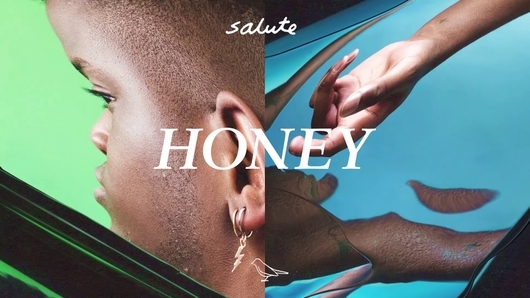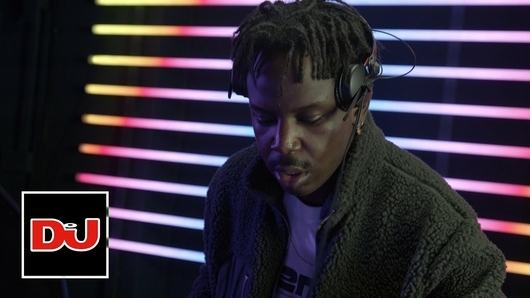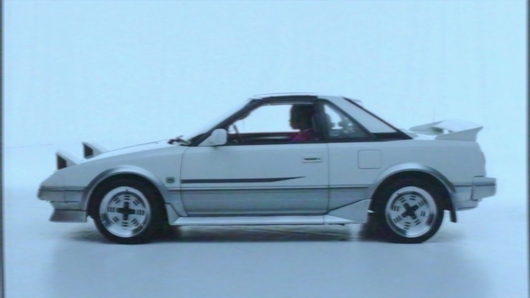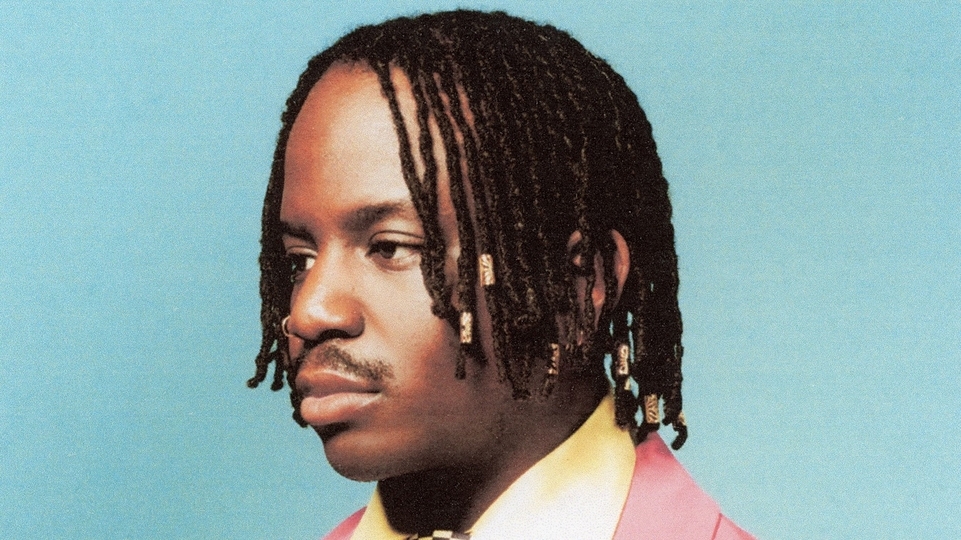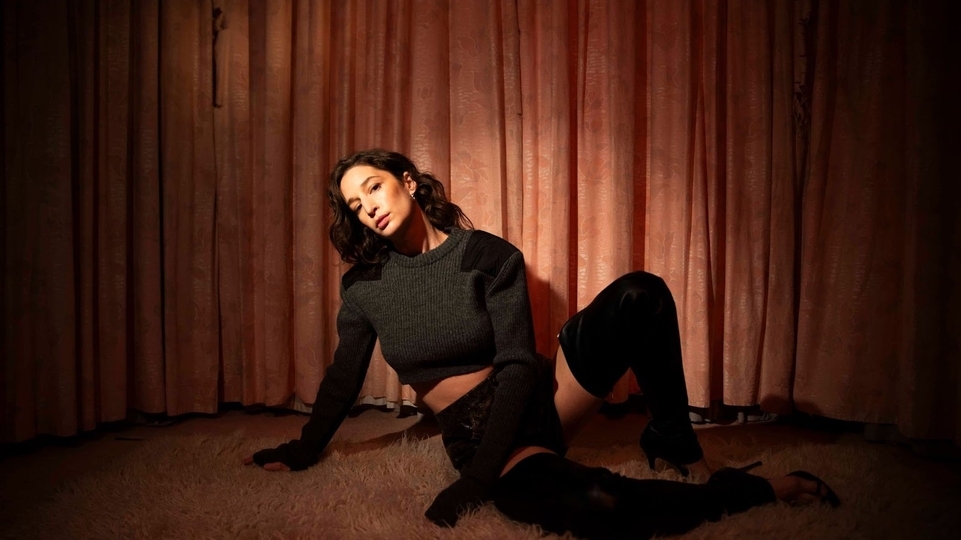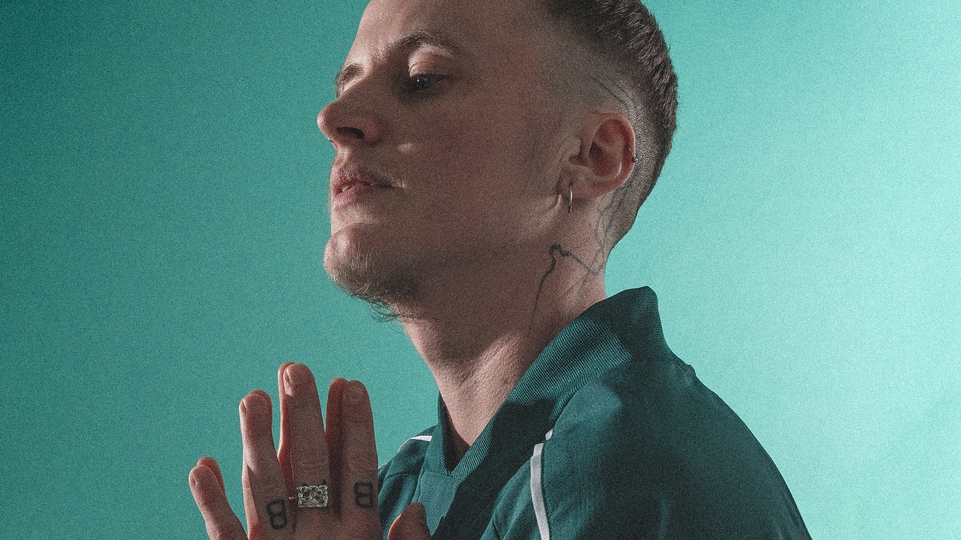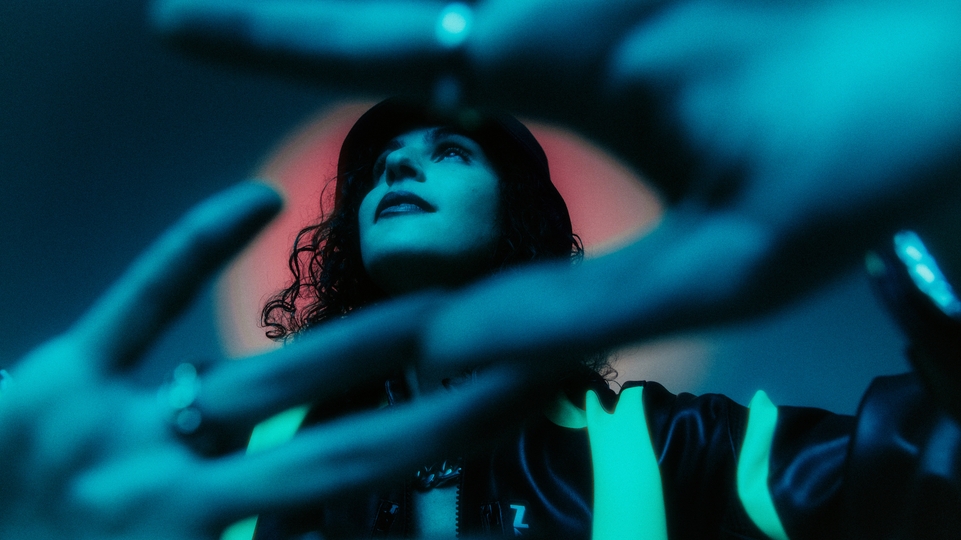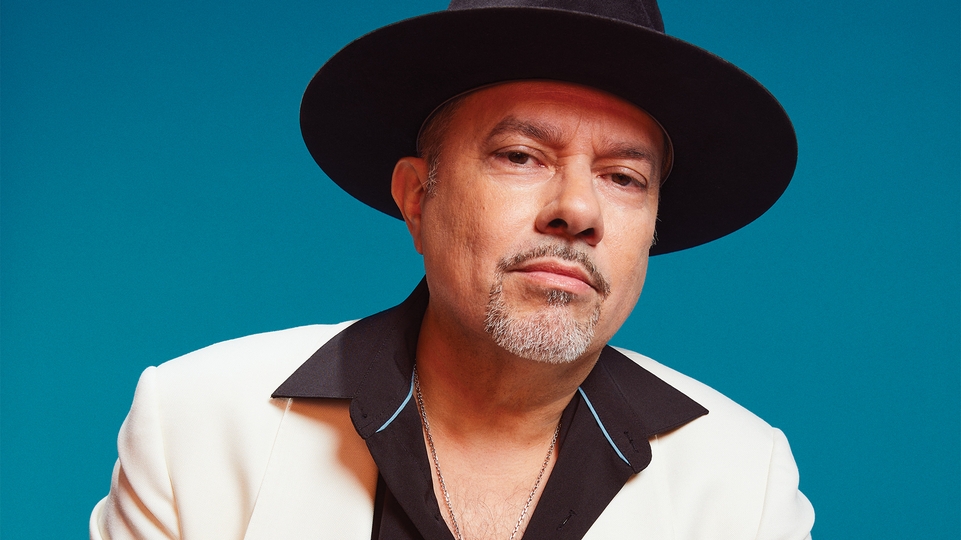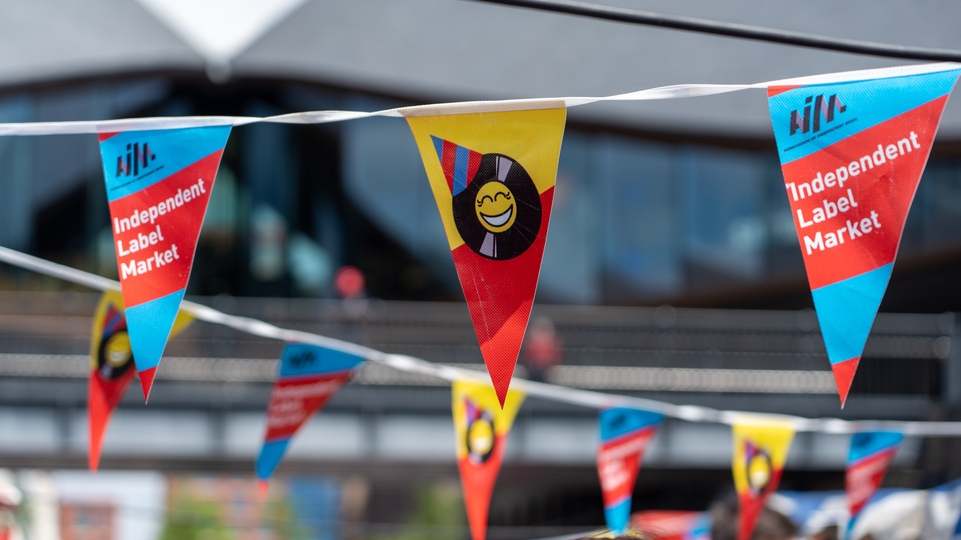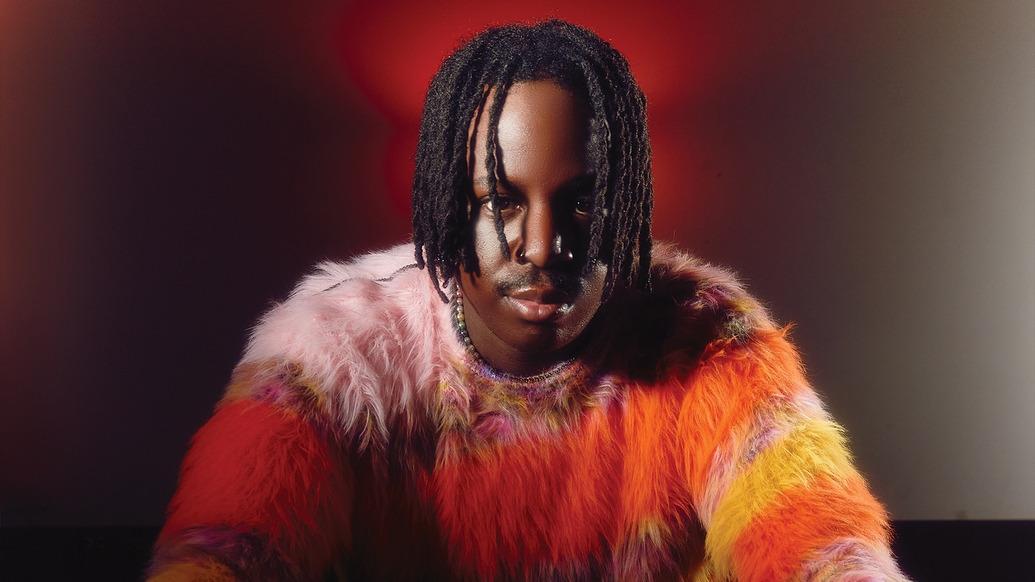
salute: push the system
Vienna-born, Manchester-based salute’s DJ sets and productions shine at the intersection of garage, French house and ‘80s synth styles. Ahead of the release of their star-studded debut album on Ninja Tune, they tell Kamila Rymajdo about their musical upbringing, flying the flag for Black artistry, and their joyful sound that, simply, makes people feel good
salute is thinking about their legacy. “I want to make music not just for the sake of making music, I want to do it because I want that music to mean something, to me, and to other people, years from now,” salute says over a Zoom call on a Friday morning in early March, about to play their first show back on their home turf of Manchester since spending the last few months touring Australia, Asia and South America.
Although, in one regard, the 27-year-old is still an emerging artist — their debut album is forthcoming on Ninja Tune — their thinking makes sense within the context of their decade-long evolution. From making pop-leaning tracks and getting recognition for remixes of Aaliyah and Sam Smith songs, to entering the dance music space with releases on Signal >> Supply and Steel City Dance Discs, salute has been garnering the support of acts like Four Tet through their infectious productions that, quite simply, make people feel good.
Thinking about legacy also makes sense given that the last two years have seen salute, whose moniker was inspired by the French greeting ‘salut’ they decided to adopt after a school trip to France, enjoy a stratospheric rise. From playing to packed out crowds at festivals like Field Day, Parklife and Glastonbury, to viral sets for Boiler Room — including a Melbourne set watched over one million times on YouTube — and getting nominated for a MOBO award in the Best Electronic/Dance category this year, it’s been a steady upward curve. “Things have been looking better for me over the last couple of years,” salute sums up humbly.
salute, real name Felix Nyajo was born in Vienna, Austria, to Nigerian parents who migrated to Europe in the early 80s, initially settling in Belgrade, before moving to Vienna to escape the Yugoslavian wars at the end of the last century. salute remembers their childhood as one spent outdoors, riding their bike and playing football with their younger brother. “We lived in a really regular suburb in a working-class part of town and we just went to the park, we did that religiously,” they say in an accent that betrays nothing of German being their first language.
Their musical education came chiefly from their family. Their mum, who worked as a nurse, and dad, who was a cab driver, played jazz, gospel, funk, soul and reggae, while their older brother got them into hip-hop and R&B. “He’d be listening to Ciara and Aaliyah and Tupac and Nas,” salute remembers. “As far as the spectrum of Black music goes, we listened to everything,” they say. But their brother also introduced salute to rock bands like Nirvana: “He had a wide taste in music, which was good for me, because when I started to find music for myself, it made me a lot more open.”
It also made salute realise their music taste was different from their peers. “I remember distinctly that when I started listening to drum & bass, I’d show my best friend and he was like, ‘What the hell is this?’ I always felt like I was listening to the weird stuff, the obscure stuff”. It didn’t make them feel alienated, though — just that they had their own mind. “The stuff that I took a lot of joy in listening to, it’s stuff that people came around to listening to anyway, just a few years after that”.
salute discovered other British genres like garage, grime and bassline through tracks they heard in video games like Sonic Rush, SSX Tricky and FIFA Street 2. At 13 years old, they got hold of a copy of Fruity Loops and started making their own tracks. Still, a passion for music didn’t necessarily mean salute knew they wanted to become a musician. “I feel like you have to distinguish between wanting to make music and following it as a career path,” they say. “And I didn’t think of it as something that I could do professionally. I mean, I was living in Austria, it’s not exactly a hotbed for dance music, it didn’t really seem like a realistic goal to have.” But when they uploaded their productions to Soundcloud, it led to meeting a community of like- minded people.
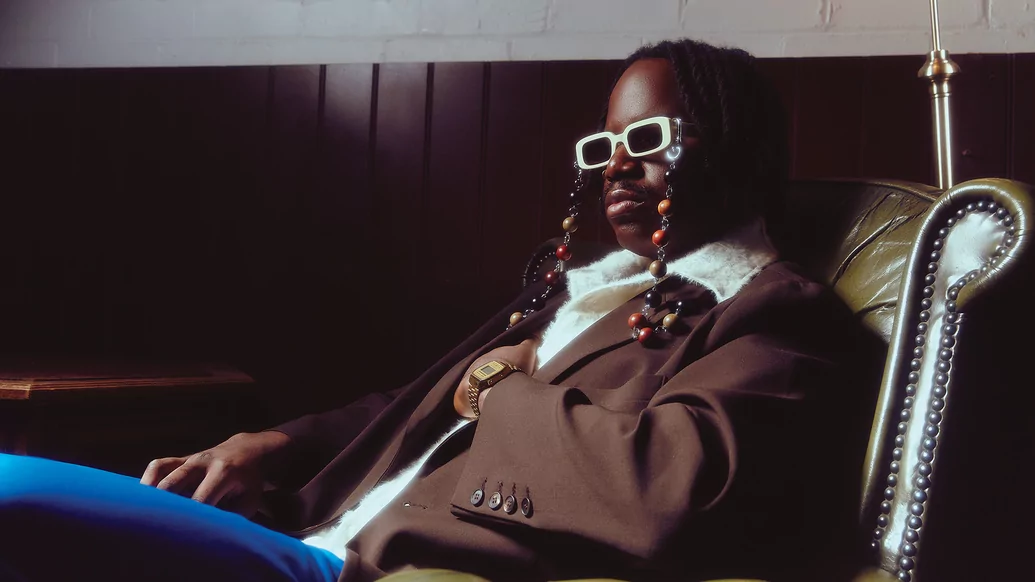
“I wanted to create a fun world that you can disappear into when you’re listening to the album, and not a concept that was really dark or heavy — I just wanted it to be light”
Eventually, salute decided they’d pursue music full time. “My parents did not approve at all,” they laugh. “But I see it from their perspective, they’re Nigerian immigrants, and making money off this is a relatively new thing. It’s not something that happens very often, so they were worried I’d be wasting my time.” To appease their parents’ desire for them to go to university while satisfying their urge to pursue music, in 2014 salute moved to the UK to begin a creative music technologies course in Brighton. “But I just didn’t feel like it was pushing me in the direction I wanted to go, which was to learn how to write better songs, not become a studio engineer,” salute says. They realised they wanted to quit when they’d find themselves going to London to join songwriting sessions, instead of attending lectures.
What emerged from this transitional time between Austria and the UK was a trilogy of emotion-driven releases — 2013’s ‘Lionheart’, 2015’s ‘Gold Rush’ and 2016’s mini-album ‘My Heart’. The vocals on the songs, like R&B artist ABRA’s on the ‘Gold Rush’ EP’s ‘Colourblind’, take centre stage and the production flits between genres — from gospel to post-dubstep and grime, while lyrics err on the side of melancholy, telling stories of love and loss. “I was making leftfield pop,” salute summarises.
In 2016, salute moved to Manchester, to become part of the creative scene there. The move also led to a change in musical direction. “Prior to 2018, I hadn’t really been making house at all, but then I kind of realised that I’d always loved house music and I wanted to try something a bit more in that direction,” they say.
“I was listening to a lot of stuff from 2013, old SBTRKT, early Hessle Audio, James Blake and Mount Kimbie, and around that time I started making house music, house and techno had gone a bit serious and dark. There was no fun anymore, and that’s around the time I made ‘Honey’ — that was the turning point for me, when I realised people are really connecting with the housey stuff I’m doing”. ‘Honey’ ended up on the ‘Condition’ three-part mixtape, where the producer fully embraced a clubbier sound.
While salute says Manchester is a great city where they connected with producers like Karma Kid and Bondax, it proved to be the place where they went through some of their darkest times. First, the trauma of losing their grandparents, and also a period of depression they went through during Covid — partly linked to the SAD [seasonal affective disorder] they get every year, but also because they didn’t see a way out of lockdown. “I ran out of money and I was just like, I don’t know if this is making me happy or not; I wake up every day making all this music, but I’m frustrated, I’m not sure of the direction. It really, really sucked.”
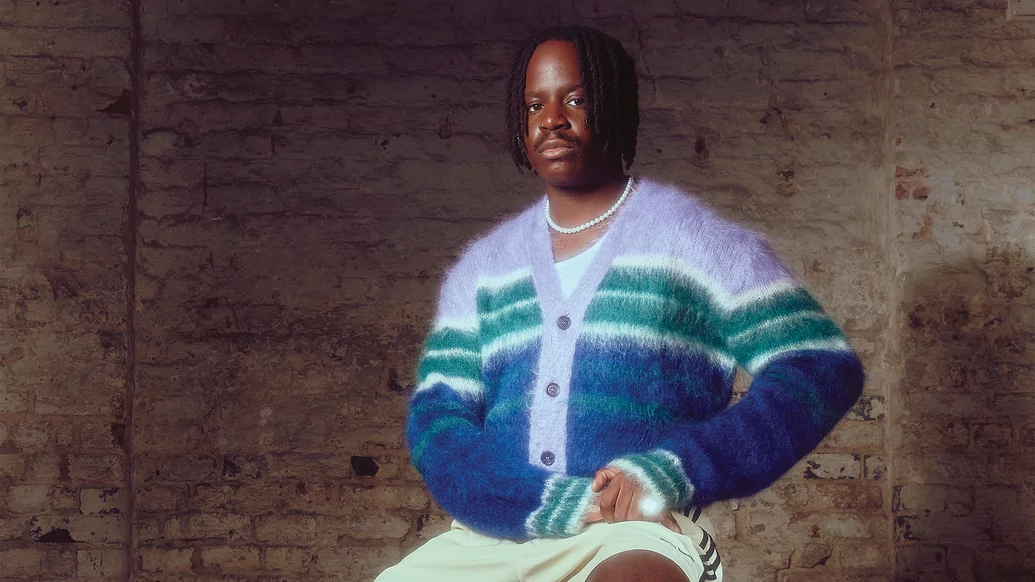
A period of soul-searching helped them to refocus. “I was thinking about what it is in dance music that makes me really happy, and around that time is when I started sampling again. I basically stopped myself from sampling years before that because clearing samples is really tough, but then I just thought, ‘Fuck it, I’m gonna sample and deal with the consequences later’” they recall, adding “when I started getting back into the old French house I used to listen to when I was a teenager — all the Daft Punk stuff, and DJ Falcon and Alan Braxe — that’s when I realised that’s the route I want to go down.”
The change in direction paid off. Their woozy, feelgood January 2021-released ‘Jennifer’ was supported with radio play on BBC Radio 1, while ‘Want U There’ was a bright, upbeat house track that seemed a perfect soundtrack to the reopening of clubs after lockdown. The popularity of ‘Joy’, released in September of the same year, then seemed to cement salute’s credentials as a crossover artist.
2022 saw salute release ‘Therapy’, a zippy, effervescent track with delightfully saccharine vocals. ‘Ultra Pool’ soon followed, an EP where salute put their taste for French touch on full display. The record was full of summery goodness — euphoric loops on ‘Sternenhimmel’ and glassy keys on ‘Pleasures’ — and this cemented salute as a creator of feel-good music. Their standout live-streamed set at DJ Mag HQ backed up their oeuvre thus far.
In 2023, salute released ‘Shield’, their critically acclaimed debut EP on Ninja Tune’s Technicolour label, which was their first release to feature their own vocals. While ‘Run Away With You’ sets a tone of promise with soaring synths and emotive vocal snippets, also courtesy of Filipino artist No Rome, ‘Wait For It’ captures the anticipation of a night out. ‘Peach’, made with UKG pioneer Sammy Virji, is a hit of pure nostalgia that went viral after salute debuted it at their Melbourne Boiler Room, leading to a remix package which included a rework from the Netherlands-based Thys of the electronic production trio Noisia.
2023 also saw salute begin work on their upcoming debut album, scheduled for release later in 2024. “I started putting the music together for it in January last year,” they reveal. “I didn’t really have an idea of what the album was going to sound like at all. I kind of approached it in a way that I hadn’t really approached projects before, in that my goal was just to make as much music as possible and pick out the best 12-14 songs.”
Decamping to “a fancy Airbnb in Kent” for a week, salute took producer friends including Karma Kid and Bondax’s Adam Kaye with them and presented 30 ideas for tracks, which they helped to develop. SBTRKT and Mura Masa collaborator LEILAH, who salute had previously worked with on their standout tracks ‘Joy’ and ‘Wait For It’, also joined and laid down vocals for two of the songs. “But because my touring schedule last year was so hectic, I did over 100 shows, I had to take blocks of time throughout the year to finish the album,” salute explains.
They drew most of their inspiration from ‘80s soul, R&B and early hip-hop. “I’m a big fan of the [Roland] D-50 and [Yamaha] DX7, the glossy sounding synths, and I think that whole era is very dramatic, the music but also visually, everything being quite soft focus; there’s something about that whole warmth that really appeals to me,” they say. “But it’s also inspired by French house and by garage, and so [the album] is exploring where those two come together and marry, with all those influences from the ‘80s.”
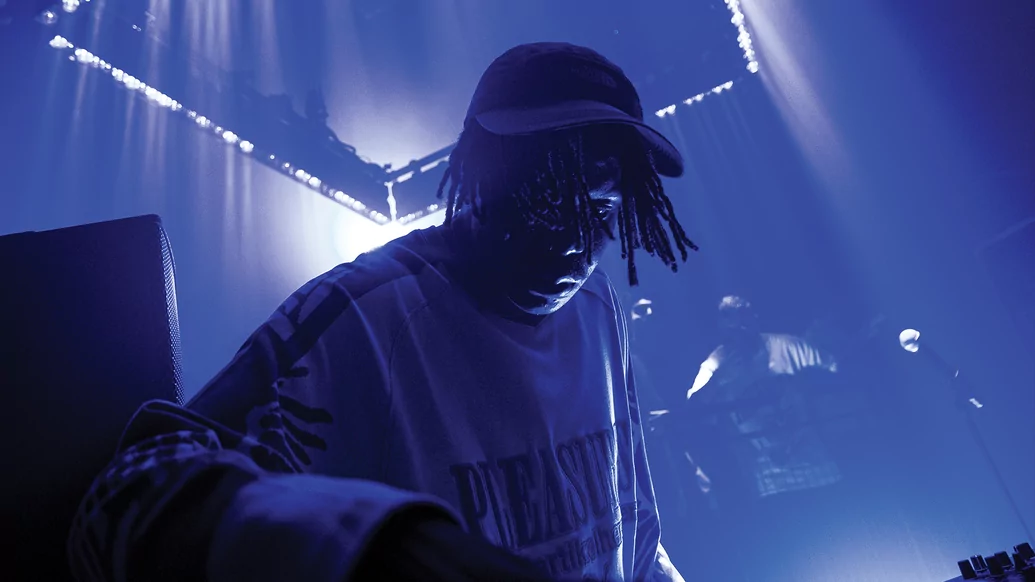
“I want my music to stay with people in a way that music stayed with people when they bought it on physical. It’s something you can do if you make your music as good and unique as possible.”
The album title was the last thing they came up with, salute says, and it’s being kept under wraps for the time being: “The music was nearing completion, and I was thinking so hard about what it was that was tying all this music together, because I never planned for it to be a concept album at all, it was just supposed to be a bunch of good songs.”
A discussion with Karma Kid led to a realisation that so much of the imagery they’d used as inspiration — and so many of the lyrics — were all about motion, energy and speed. “Previously through lockdown when I was posting tunes online that I’d made, I was always editing them to old Japanese car ads because I got really into that stuff when I was a bit younger,” salute says. “And I’d always loved how Japanese ads from the ‘80s were very in your face, a bit of a sensory overload, and so I had this idea to base the album on the name of a race car.”
The album title is also about how salute wanted people to feel when listening to it. “Without sounding really narcissistic, it’s me trying to explain what the album listening experience feels like, or what I want it to feel like,” they say. “It’s very happy, it’s very emotional, and so that’s the feeling I want people to feel when they’re listening to the album.” “I wanted to create a fun world that you can disappear into when you’re listening to the album, and not a concept that was really dark or heavy — I just wanted it to be light,” salute continues, explaining that in this fantasy world, the self-driving car’s journey is narrated by all the featured artists, from [British-Japanese singer and actor] Rina Sawayama to [American singer-songwriter] Empress Of.
The features on the album came together organically, salute says. For example, [Scottish producer] Sam Gellaitry is a good friend they’ve known for nine years. “I didn’t want him as a producer, I knew that I wanted him to sing,” salute says. “And he’s never done a vocal feature before but I had this beat and we were playing this festival in Sweden, and backstage I was just playing it to him on my phone and he said, ‘Yes, let’s do it’.” To record, salute ended up having to track Gellaitry down in LA, flying back early from a show in Mexico. “We only had three hours,” salute laughs, “but we made the tune together and it was sick.”
Other featured artists include French multi-instrumentalist Léa Sen and Japanese rapper な かむらみなみ, as well as the huge dance duo Disclosure. “It was great to work with such a breadth of artists, they represent my taste in music, but they’re all people I also really admire,” salute says. “The whole album is very collaborative,” salute continues, “not only in the features but also with the people I worked with on the production.” This was important because salute wanted to approach the project like a pop album, in a way going back to their roots, but arguably now in a way that comfortably combines both pop and dance to maximalist effect.
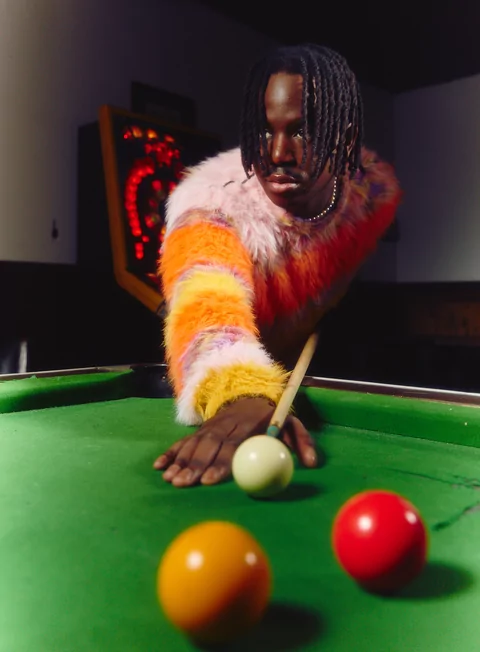

2025 will see salute putting together a live show to accompany the album, which they say will include live instrumentation. But beyond that, they don’t want to think too far into the future. “I could completely change, I could make a folk album next year,” salute says. “Well, probably not,” they laugh. Given salute’s ability to master pretty much any genre and make it their own, it’s probably fair to say that even a salute folk album would sound great. The proof is in this forthcoming long-player.
Whether it’s from their wide-ranging musical education from their family or their history of experimenting with different sounds through production, the album feels like the best example yet of salute’s encyclopaedic musical knowledge and, chiefly, mastery of various genres. From the pumping sidechain compression of Deadmau5 to Cassius-style vocal cut-ups and the record moving seamlessly between Todd Edwards two-step and MJ Cole UKG breaks, to vocals that evoke Kelela, you can find the recent history of dance and pop music scattered throughout the tracks, but sounding fresh — crucially, sounding distinctly salute.
For the time being, salute is chiefly thinking about how the forthcoming album will be experienced by its listeners, reflecting on the changes in the way music is being consumed. “If you were buying music in the early 2000s you were often buying a CD and that CD would have liner notes in where you could read all the lyrics, you could see who produced the song, who wrote the song, where it was mixed, who mastered it, and it would make you appreciate it more,” they say, adding “aside from listening to radio, people could only listen to the music they’d bought, which is insane compared to what you have now, when you have millions of songs at your fingertips, which obviously means that you don’t view every individual song with as much value.
“But I want my music to stay with people in a way that music stayed with people when they bought it on physical,” salute says. “It’s something you can do if you make your music as good and unique as possible, but also packaging it in a way that will make people care about it.” That doesn’t necessarily mean releasing an album physically — though the forthcoming album will be available on vinyl with liner notes that will look like the inside of a car manual. “I want people to feel like they’re part of something, to build community,” salute says of the wraparound experience. Part of that, salute explains, is being a visible Black voice and role model within contemporary dance music, where, as they point out, there is a distinct lack of Black artists.
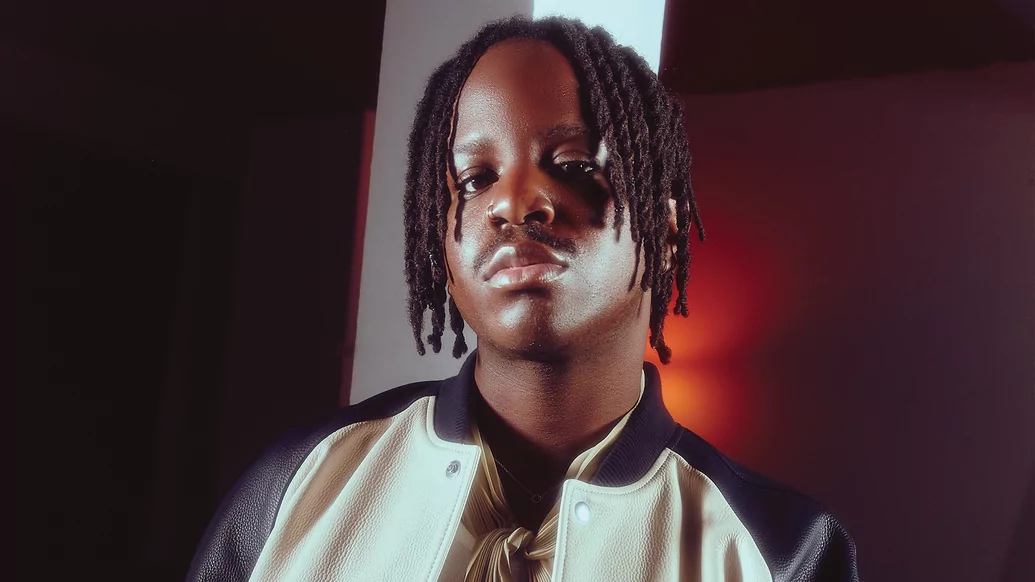
“If you ask other Black DJs, the ones who are still in the limelight, it’s almost like we’re flying the flag for Blackness in dance music and reminding people where the roots in dance music lie, acting like an educator. That’s something that I feel very strongly about, because dance music is Black music and I don’t think people see it as such anymore.”
“If you ask other Black DJs, the ones who are still in the limelight, it’s almost like we’re flying the flag for Blackness in dance music and reminding people where the roots in dance music lie, acting like an educator,” salute says. “That’s something that I feel very strongly about, because dance music is Black music and I don’t think people see it as such anymore.”
“When Black people come to my shows and they come up to me afterwards, and they say, ‘I started DJing, or I started making music because I’ve seen what you’re doing’, that’s where I’m like, okay, this is good, this is what’s needed,” they say. “That’s the space I want to take up, to be there for other Black people who are wanting to make a start in dance music, to make them feel like they can do it too.” It’s also why they have an inclusion rider [a stipulation in an artist’s contract that asserts their wish to play on diverse line-ups that strive towards an equal representation for people from marginalised communities], and want to use it to push for more change, beyond diversity. “The next point is not just that people from under-represented parts of society are visible, but also that they’re compensated fairly.”
salute’s thoughtful approach to how they present themselves as an artist is also evident in the way that they DJ. “I think playing certain parts of the night fulfils such different needs,” they say. They describe their own approach through explaining what they played during a seven-hour set in New York to cap off their 2023 North America tour. “I started by playing Sade and old hip-hop, I didn’t play any dance music for the first hour,” salute says. “Anyone can go out and play a load of bangers for two hours, anyone. It’s not difficult, but warming up is such a skill.”
It seems salute puts as much craft into their DJ sets as they do their productions. “I think a dance music night should have an arc, you don’t want to be absolutely slapping people’s ears off when they’ve just arrived and getting their first drink, you want to ease them into it.”
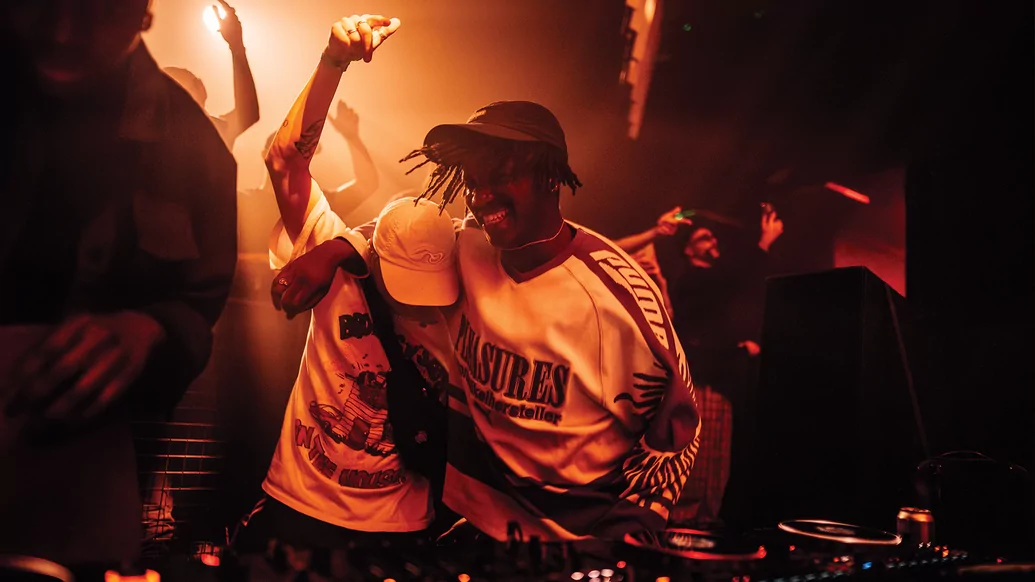
When DJ Mag arrives at the cavernous Archive space of the Warehouse Project a few days later, where salute is about to play their homecoming show, the crowd — a mix of young and older revellers, from groups of lads in shorts and t-shirts to millennial couples in tender embraces — is already revved up from sets courtesy of Not Bad For A Girl DJs, DJ Paulette and Daphni, who were also playing the BBC 6 Music Festival event. When salute emerges with DJ Seinfeld just after midnight to take over from Daphni, the three pose for a photo and the night’s story arc takes on a new turn from the instrumental of Ruff Sqwad’s ‘Together’, one of the final tracks in Daphni’s set.
Wearing a dark t-shirt, with their locks partially covering their face, salute begins their back-to- back set alongside close friend DJ Seinfeld with a marked focus on the decks. As the duo begin building up momentum by dropping their own tracks into the mix, like DJ Seinfeld and Confidence Man’s ‘Now U Do’, salute’s focus gives way to more eye contact and interaction with the crowd. They dance enthusiastically to their friend’s selections, encouraging the revellers, their hands in the air. It feels like a conductor directing an orchestra.
Similarly, when salute drops their own tunes like ‘Heaven’ from ‘Ultra Pool’, the crowd’s energy steps up to a new level. Illuminated by the warm glow of the night’s visuals projecting from the ceiling like a race track in the sky, the album’s lead single ‘System’ seems an especially perfect soundtrack. The fans seem to think so too, as it’s when several of them climb on their friends’ shoulders for a better view.
The room takes on a mood of euphoria when salute drops ‘Wait For It’ — fans sing along to every word. And, even when the duo play DJ Seinfeld’s edit of ‘Archangel’ by Burial, the dark brooding synth line and yearning vocals sound optimistic in the context of the pair’s set of fizzed-up, pop-tinged anthems.
Throughout their set, salute and DJ Seinfeld hug and their mutual respect for each other comes to a fitting climax when salute plays fan favourite ‘Joy’ and DJ Seinfeld begins jumping up and down, his hand on salute’s shoulder. Fittingly, the duo finish their set with salute’s remix of DJ Seinfeld’s ‘Someday’, capping off what feels like 80 minutes of pure fun for them and the audience.
The set also feels like salute’s crossover moment. Playing to a big hometown crowd of not only fans, but the wider 6 Music Festival attendees who are now exalted converts, it seems the community that salute is building just got bigger. In fact, it feels like the legacy that they are striving for is being written in real time.
